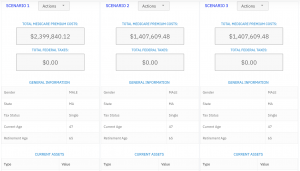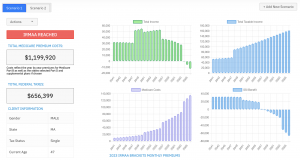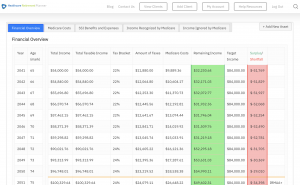Ever felt like you were in a tangle, attempting to find the correct way out? If so, you might understand how it feels navigating the labyrinth of Medicare premiums. Specifically, when dealing with an IRMAA appeal. The Income-Related Monthly Adjustment Amount (IRMAA) can feel like a riddle wrapped inside an enigma.
You may be wondering why your Medicare premium shot up without warning or what determines these monthly adjustment amounts. Perhaps life has thrown you curveballs—like marriage, divorce or work reduction—that have significantly changed your income situation.
Fear not! By venturing into this post further, we’ll illuminate the twists and turns of IRMAA appeals for you. From understanding how Social Security Administration uses tax returns to calculate adjustments to strategizing successful appeals—we’ve got all angles covered.
Let’s delve deeper into the intriguing puzzle that is IRMA. This fascinating topic deserves a closer look, as it offers countless opportunities for exploration and discovery.
Understanding IRMAA and Its Impact on Medicare Premiums
The Income-Related Monthly Adjustment Amount, or IRMAA, is an extra charge added to your Medicare Part B and Part D premiums if your income goes over a certain limit. But how does this work exactly?
How is IRMAA calculated?
The Social Security Administration (SSA) determines the IRMAA based on the modified adjusted gross income you reported on your IRS tax return from two years prior. This means that if you’re paying higher Medicare premiums now, it’s likely because of what was reflected in your tax returns then.
Suppose, for example, that two years ago you saw a notable upturn in earnings from selling land or receiving pension payments. Your monthly adjustment could rise as well because SSA takes into account all forms of income including wage earnings, dividends from investments, rental property profits and more.
In fact, according to SSA guidelines, even social security benefits count towards this calculation. It may feel like they’ve got their hands in every pie.
This might seem daunting but don’t fret – there are ways around these high charges through something called an ‘IRMAA appeal’. More about that later though – I wouldn’t want to spill all my secrets just yet.
Life-Changing Events That Can Influence Your IRMAA
This means you could potentially qualify for a lower or adjusted IRMAA.
Firstly, let’s talk about the big M – marriage. Tying the knot isn’t just about sharing your Netflix password; it can also affect your modified adjusted gross income and thus change your monthly adjustment amounts.
Marriage and Divorce
If cupid strikes or if things don’t work out in paradise resulting in divorce, these are both qualifying events that can influence how Social Security determines your IRMAA. Remember though, any changes to marital status need to be reported to Social Security Administration.
Losing Your Spouse
Sadly, death is part of life’s journey too. Losing a spouse will drastically alter many aspects of one’s financial picture including potentially lowering one’s tax returns which could result in an amended assessment of the IRMAA.
An Unexpected Work Stoppage
A sudden stoppage at work due to layoffs or early retirement may significantly reduce income-related monthly adjustments because less income generally equals less taxes paid – again leading to potential modifications in premium calculations by Social Security Office.
Employer Settlement Payment: The Silver Lining?
- If you receive an employer settlement payment after losing employment involuntarily such as through redundancy then this lump sum payout should not count towards calculating annual earnings for determining whether you fall into high-income brackets where increased charges apply under Medicare Part B and D prescription drug coverage plans.
These are just some examples of life-changing events that can influence your IRMAA. To find out more about how these changes could impact you, reach out to a local Social Security office. You might be surprised at the potential savings.
Key Takeaway:
Remember, IRMAA isn’t necessarily fixed. Significant life changes such as getting married, divorcing or losing a spouse can significantly alter your financial situation and affect the amount you pay for Medicare premiums. Even unexpected job loss or employer settlements might reduce your income-related monthly adjustments. Therefore, if life throws a curveball at you, don’t hesitate to check with Social Security – there could be an opportunity for potential savings.
Navigating the Process of Filing an Appeal
Disagreeing with your determined IRMAA isn’t a dead-end. It’s time to appeal. But how do you start this process? You need to ask for reconsideration by filling out and submitting an Appeal form (SSA-44).
The first step is getting your hands on that determination letter, which will include the initial decision about your income-related monthly adjustment amounts. This document contains crucial information about why Social Security made their choice.
Your next move? Gathering supporting documents like amended tax returns or proof of life-changing events such as spouse marriage divorce or work reduction. These items help show that there has been a significant change in circumstances since Social Security determines your Medicare premium based on IRS data from two years ago.
Completing Your Form
To get started, jot down details of any recent life-changing event in Part 1 of the SSA-44 form. Make sure to provide clear explanations; clarity can be decisive.
In Part 2, project what you expect this year’s modified adjusted gross income (MAGI) to be—remember, it should reflect changes due to those pesky life events we talked about earlier.
Filing Your Completed Form
For the best outcome, visit a local social security office to submit your forms. Yes—you’ll have better luck dropping off these forms in person rather than mailing them.
Last but not least: patience. The review process takes some time, but rest assured your case will be carefully evaluated. If the appeal is successful, your Medicare premium could drop—a victory worth waiting for.
So don’t let that IRMAA determination letter bring you down—grab it by the horns and make a change.
Real-life Scenarios for Requesting an Initial Determination or Appealing an Existing One
Life’s unexpected twists and turns can drastically change your financial landscape. When it comes to Medicare, these changes may mean you need to request a new initial determination for your IRMAA or appeal an existing one.
When You Might Need To Request A New Initial Determination
Say, due to certain life-changing events, like the death of a spouse, marriage, divorce or loss of income-producing property from years prior. These instances might call for a fresh look at your current IRMAA status. In other words – yes. Even receipt of an employer settlement payment could qualify as grounds for requesting a new initial determination.
Apart from life-changing events leading to work stoppage or reduction in pension income that would require revisiting your IRMAA decision; there are scenarios when you’d need this too. For instance, if social security determines monthly adjustment amounts based on modified adjusted gross incomes reported two years back but those numbers no longer reflect present circumstances.
If significant alterations occur after filing tax returns affecting adjusted gross incomes – think Roth IRA distributions leading to lower MAGI (Modified Adjusted Gross Income) – such changes warrant reassessment by Social Security Administration offices across the nation.
The Art Of Appeal: Situations That Warrant Reconsideration
You’ve got mail. The envelope contains not just any letter but one with Medicare premium increase news courtesy of increased prescription drug coverage costs thanks largely in part due TO…IRMAA.
This isn’t just another day at the office; this is cause enough to raise eyebrows and possibly trigger appeals given how crucial prescription drug coverage is to your health and well-being. A sharp rise in Medicare Part B premiums may feel like a bitter pill to swallow, but with the right knowledge and assistance, you can navigate this hurdle.
If social security’s IRMAA determination feels off kilter based on income reported two years ago – especially if it doesn’t account for recent financial changes – consider reaching out to your local Social Security office.
Key Takeaway:
Life’s curveballs can change your financial situation and may call for a reevaluation of your IRMAA status. Significant life events, income shifts or drastic increases in Medicare premiums could be grounds to request a new initial determination or appeal an existing one. Remember – the right knowledge and help will let you navigate this process effectively.
Factors to Consider Before Filing an Appeal for IRMAA
If you’ve received a high-income surcharge based on your Medicare benefits, it’s natural to question the decision. Before taking any steps to dispute the decision, it’s important to think about a few key points.
The Social Security Administration determines your IRMAA (Income Related Monthly Adjustment Amount) by analyzing your income reported on IRS tax returns from two years prior. It can feel unfair if your current financial situation has changed drastically since then. So what should you do?
Evaluate Your Current Financial Status
Analyze whether any life-changing events have affected your modified adjusted gross income significantly since those tax returns were filed. This could include marriage or divorce, work reduction, or receiving an employer settlement payment.
A lower present-day income may make a compelling case for filing an appeal against the initial determination of IRMAA made by SSA.
Determine Whether You Have Adequate Proof
You’ll need substantial evidence demonstrating that change in circumstances like altered pension income or loss of property which caused reduced earnings now compared with what was declared in past tax returns.
Weigh The Potential Benefits Against The Effort Required
Filing for reconsideration involves paperwork and potentially numerous visits to the local social security office; so ask yourself – is this extra effort worth it? Could there be other strategies that might help reduce my Medicare premiums without having to go through this rigmarole?
Note: Do remember each case is unique and requires personalized analysis before deciding on pursuing such appeals.
Strategies for a Successful Appeal for Medicare IRMAA
Appealing an Income-Related Monthly Adjustment Amount (IRMAA) decision can feel like trying to find your way through a maze. But, with the right strategies in hand, you can navigate this process effectively.
The first step is getting familiar with the Medicare Income-Related Monthly Adjustment Amount-Life-changing Event form (SSA-44). This form is your key tool for appealing an IRMAA decision.
One strategy that’s often overlooked but quite effective involves using amended income tax returns. You see, Social Security determines your IRMAA based on your reported income from two years prior. If you’ve had a significant drop in income since then—perhaps due to retirement or other life changes—an amended return could be used to show this decrease and potentially lower your Medicare premium.
Navigating Local Offices
If you’re more comfortable discussing sensitive financial matters face-to-face rather than sending them into cyberspace, don’t worry. You can submit these forms at any local social security office – just use their office locator tool.
Beyond Forms: Additional Strategies
You might also want to consider seeking help from professionals who specialize in Medicare planning and appeals. They’ll have the expertise needed to guide you through each step of the appeal process.
A final word of advice? Patience really is virtue when it comes to navigating bureaucracies such as Social Security Administration.
Comparing Your Options in Response to an Unfavorable IRMAA Decision
If you’re unhappy with your determined IRMAA, there are several steps you can take. First off, consider filing for a reconsideration or appeal if you disagree with the decision made by the Social Security Administration.
Filing an IRMAA Life-Changing Event form (SSA-44) is another viable option. This could be especially relevant if your income has significantly changed due to life events such as marriage, divorce, work reduction or loss of pension income.
You might also want to explore amending your tax returns from two years prior – this data forms the basis on which SSA determines monthly adjustment amounts and overall Medicare premiums. Remember that adjusted gross income and any changes therein directly influence how much you pay towards prescription drug coverage under Part D of Medicare Advantage Plan.
Taking Action at Local Level
Making use of resources available through local social security offices can provide added help during these challenging times. They have professionals who understand nuances of situations like property loss due to natural disasters or receipt of employer settlement payment that might impact your modified adjusted gross income figures reported earlier.
The Role Of Timely Decisions And Correct Reporting
In some cases, simple actions like reporting accurate figures related to Roth IRA withdrawals or making timely decisions about when spouse marriage should occur post-divorce could make all the difference in standard premium adjustments over time. It’s important not just because it impacts what you owe today but also sets a precedent for future payments as well.
A Final Word On Reconsiderations And Appeals
Recall, a request for reconsideration is distinct from submitting an appeal. You ask for reconsideration when you believe there’s been a mistake in calculation or interpretation of facts. On the other hand, appealing is something you do when all else fails and you still think your IRMAA income-based monthly adjustment amount isn’t fair.
Key Takeaway:
Medicare premiums. Reach out to local social security offices for guidance, and always double-check your numbers. Remember, accurate reporting can make a huge difference in your IRMAA outcomes.
Understanding Potential Outcomes and Implications of an Appeal
Filing an appeal against your Income-Related Monthly Adjustment Amount (IRMAA) determination can have several outcomes. Let’s explore what they might be.
If the SSA grants your appeal, you may observe a diminishment in your Medicare fees. This is because SSA determines IRMAA based on the income reported on IRS tax returns from two years prior. If you’ve had a significant drop in modified adjusted gross income since then, like after a work reduction or property loss, this could result in lower monthly adjustment amounts for Part B and Part D prescription drug coverage.
On the other hand, if SSA disagrees with your reasons for appealing—maybe because they don’t find enough evidence of reduced pension income or lack thereof due to marriage divorce—you may continue paying higher Medicare premiums. However frustrating that might feel like being asked to pay extra at an ice cream shop without getting more scoops.
Possible Scenarios Post-Appeal
In some cases, filing an amended tax return showing reduced income might lead to reconsideration by SSA even after initial denial of appeal request—an experience as refreshing as finding forgotten money in old jeans. So it pays off sometimes not just accepting things lying down but questioning decisions when we think there’s been error made.
In contrast though; imagine walking into the local social security office with loads of hope only to come out feeling disappointed? That’s a similar disappointment faced by those whose appeals are denied outright despite their best efforts—a bit akin to losing a race before the finish line. Nonetheless, don’t let that deter you; there’s always the possibility of reappealing given sufficient new proof of substantial change in circumstances.
Remember, the journey of appealing an IRMAA decision can be as unpredictable and adventurous as a rollercoaster ride. But understanding possible outcomes and their implications could help you strap in better for the twists and turns ahead.
Key Takeaway:
Appealing your IRMAA determination can feel like a rollercoaster ride, but knowing the potential outcomes gives you control. A successful appeal could mean lower Medicare premiums if income changes are significant enough. But be prepared for possible disappointments – an unsuccessful appeal might leave you paying more without benefits or facing outright denial despite best efforts. Remember, even after initial setbacks, don’t lose hope because perseverance often leads to positive results in the end.
FAQs in Relation to Irmaa Appeal
How do you appeal Irmaa successfully?
To win an IRMAA appeal, gather proof of income changes or life-altering events. Then submit the SSA-44 form to Social Security.
How do I appeal Medicare Irmaa Form 2023?
You can challenge a Medicare IRMAA decision by filling out and sending in the SSA-44 form.
How many years does Irmaa look back?
The IRS looks two years back when determining your IRMAA based on your tax return income.
Is there any way to avoid Irmaa?
Avoiding IRMAA is tricky but lowering taxable income and timing large financial transactions wisely could help dodge it.
Conclusion
Decoding the IRMAA appeal process doesn’t have to feel like an insurmountable task. With the right understanding and approach, you can navigate this maze successfully.
You’ve learned how Social Security Administration uses your tax returns from two years prior to calculate your Medicare premiums adjustment. Remember, significant life changes like marriage or divorce can influence these adjustments too.
If ever in disagreement with an initial determination of your IRMAA, don’t shy away from appealing it. You now know that submitting a completed form SSA-44 is a crucial part of this process.
In conclusion: knowledge is power when it comes to handling matters as complex as an IRMAA appeal. Keep these takeaways at hand and empower yourself towards better managing your Medicare premiums!
Table of Contents:
- Understanding IRMAA and Its Impact on Medicare Premiums
- Life-Changing Events That Can Influence Your IRMAA
- Navigating the Process of Filing an IRMAA Appeal
- Real-life Scenarios for Requesting an Initial Determination or Appealing an Existing One
- Factors to Consider Before Filing an IRMAA Appeal
- Strategies for a Successful IRMAA Appeal
- Comparing Your Options in Response to an Unfavorable IRMAA Decision
- Understanding Potential Outcomes and Implications of an IRMAA Appeal
- FAQs in Relation to Irmaa Appeal
- Conclusion
Streamlining the Medicare Surcharge Calculation Process.
Our Healthcare Retirement Planner software is designed to streamline the retirement planning process for financial professionals. By providing an efficient way to calculate IRMAA costs, our tool helps you save time and focus on other aspects of your clients’ retirement plans.
- Faster calculations: Our software quickly calculates IRMAA costs based on your client’s income and tax filing status, eliminating manual calculations and potential errors.
- User-friendly interface: The intuitive design of our platform makes it easy for financial professionals to input data and generate results with minimal effort.
- Data integration: Seamlessly integrate our calculator into your existing financial planning tools or CRM systems for a more streamlined workflow.
- Easy to Understand Reports: Export reports to easily share with your clients
- Tax and Surcharge Modeling: see how different types of income affects both taxes and your surcharges.
In addition to simplifying the calculation process, using our Healthcare Retirement Planner can also help improve communication between you and your clients. With clear visuals that illustrate how IRMAA costs impact their overall retirement plan, you can effectively convey complex information in an easily digestible format. This enables clients to make informed decisions about their healthcare expenses during retirement while ensuring they are prepared for any potential changes in Medicare premiums due to income fluctuations. To learn more about how our software can benefit both you as a financial professional and your clients’ retirement planning experience, visit the features page. Streamlining retirement planning processes can help financial professionals save time and resources, allowing them to focus on other areas of their clients’ needs. Automated calculation of IRMAA costs is the next step in streamlining this process even further.






